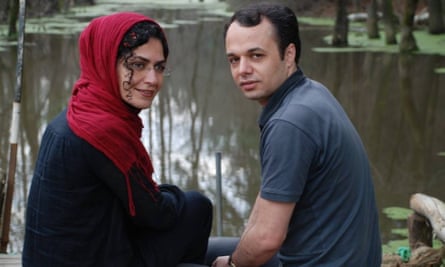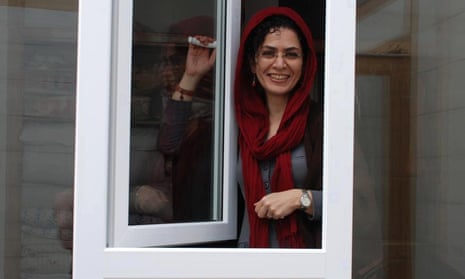More than 30 leading university professors have signed an open letter urging Iran’s president and its chief of judiciary to release the respected student activist Bahareh Hedayat, who has spent more than six years in jail.
Hedayat, arrested in 2009, was expected to be released this summer after serving her original sentence in full, but it has since emerged that she has to spend an extra two years in prison.
“This is outrageous and unacceptable,” wrote academic figures from top universities in the US, UK and other European countries. The letter has been addressed to Iran’s president, Hassan Rouhani, and the country’s head of judiciary, Ayatollah Sadeq Amoli Larijani.
The list of signatories includes MIT’s Noam Chomsky, Juan Cole, David Harvey, Dick Davis and Richard Tapper. Prominent Iranian academics have also put their names on the letter, including Columbia University’s Hamid Dabashi and City University of New York’s Ervand Abrahamian.
“Since her marriage seven years ago to another student activist, Amin Ahmadian, they have spent less than a year together,” the letter reads. “We are encouraged by the reports that Iran will undertake much-needed social reforms in the light of the nuclear agreement. It is time to end the injustice against Bahareh and bring the Kafkaesque circumstances of her detention to an end.”
The landmark nuclear agreement struck between Iran and the world’s six major powers in July raised hopes that Rouhani would now shift his attention towards social freedoms. But this is yet to materialise as hardliners resist any internal change initiated by Rouhani’s moderate administration.
The situation of human rights in Iran remains as a matter of great concern, with dozens of peaceful activists still locked behind bars and opposition leaders Mir Hossein Mousavi and Mehdi Karroubi still placed under house arrest. The fate of Jason Rezaian, the Washington Post repoter held in Iran for more than a year, is also still unclear.
Such crackdowns are carried out by the country’s hardline judiciary and intelligence apparatus that operate independently of Rouhani’s government. However, the president can use his position to speak out about human rights violations as permitted under Iran’s constitution. Rouhani has largely remained quiet on these matters and is yet to deliver on his election promises for social reforms, but it is not clear if he has done any lobbying in private.
Hedayat, a founding member of the One Million Signatures campaign, a petition for women’s rights in Iran, has been arrested repeatedly in the past decade, including on the day before her wedding seven years ago as plain-clothes officers raided her house and took her to prison.
She was released a month later, but was rearrested after Mahmoud Ahmadinejad’s disputed re-election in 2009. She fell foul of the authorities for speaking out about the post-election crackdown, especially for giving an interview to the BBC’s Persian service, which is loathed by the Iranian establishment.
She was subsequently sentenced to seven-and-a-half years in jail. That includes five years for acting against the national security, two years for insulting the Iranian supreme leader, Ayatollah Ali Khamenei, and six months for insulting Ahmadinejad. But Ahmadinejad has himself fallen out of grace, with many of his closest allies and deputies being jailed for corruption after Rouhani took office in 2013.
“She has been in jail for six years for being a peaceful and unambiguous critic of Ahmadinejad,” her husband, Ahmadian, told the Guardian last month. “And now a few wards away in that same prison, some of the former president’s most senior deputies are held for corruption.”
Hedayat is held at the women’s ward at Tehran’s notorious Evin prison, where female prisoners do not have access to a telephone. Around 18 women considered to be prisoners of conscience are held there, including Hedayat. Of those, 10 are mothers and four have children below the age of 10.

Here is the full letter:
President of the Islamic Republic of Iran His Excellency Hassan Rouhani
The Head of Iran’s Judiciary Ayatollah Sadeq Amoli Larijani
Your Excellencies,
We, academic figures at some of the world’s most distinguished universities, are appalled by the continuing detention of Bahareh Hedayat, one of Iran’s most respected student activists who has spent the past six years in jail.
She should have been released earlier this year under the original sentence but this week she was told that she should spend an extra two years in prison. This is outrageous and unacceptable. Since her marriage seven years ago to another student activist, Amin Ahmadian, they have spent less than a year together.
We are encouraged by the reports that Iran will undertake much-needed social reforms in the light of the nuclear agreement. It is time to end the injustice against Bahareh and bring the Kafkaesque circumstances of her detention to an end. We urge you to immediately release her so that she can be reunited with her family.
Sincerely
Signatories (in alphabetical order):
- Professor Ervand Abrahamian, City University of New York
- Professor Torsten Åkesson, Lund University, Sweden
- Professor Nadje Al-Ali, SOAS, University of London
- Professor Golbarg Bashi, Pace University
- Professor Asef Bayat, University of Illinois at Urbana-Champaign
- Professor Mehrzad Boroujerdi, Syracuse University
- Professor Noam Chomsky, MIT
- Professor Juan Cole, University of Michigan
- Professor Hamid Dabashi, Columbia University
- Professor Dick Davis, Ohio University
- Professor Kaveh Ehsani, DePaul University
- Professor Farideh Farhi, University of Hawai’i
- Professor Mark Gasiorowski, Tulane University
- Professor David Harvey, City University of New York
- Professor Nader Hashemi, University of Denver
- Professor Hossein Kamaly, Columbia University
- Professor Ahmad Karimi-Hakkak, University of Maryland
- Professor Arang Keshavarzian, New York University
- Professor Laleh Khalili, SOAS, University of London
- Professor Mehdi Khorrami, New York University
- Professor Kamran Matin, Sussex University, UK
- Professor Ziba Mir-Hosseini, SOAS, University of London
- Professor Ali Mirsepassi, New York University
- Professor Kamran Rastegar, Tufts University
- Professor Ruth Rubio-Marín, European University Institute, Florence
- Professor Mahmoud Sadri, Federation of North Texas Area Universities
- Professor Muhammad Sahimi, University of Southern California
- Professor Annabelle Sreberny, SOAS, University of London
- Professor Richard Tapper, SOAS
- Professor Peyman Vahabzadeh, University of Victoria
- Professor Ethan Zuckerman, Media lab, MIT

Comments (…)
Sign in or create your Guardian account to join the discussion